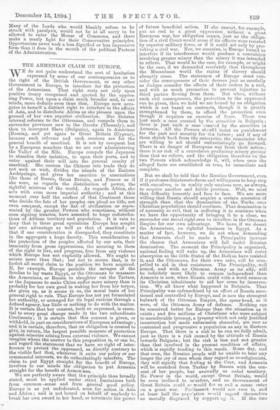THE ARMENIAN CLAIM ON EUROPE.
WE do not quite understand the sort of hesitation expressed by some of our contemporaries as to the right of the British Government, or any other Government in Europe, to interfere for the protection of the Armenians. That right rests not only upon positive treaty recognised and quoted by the oppres- sing Power, but upon a claim much broader and, to our minds more definite even than that. Europe now arro- gates to herself a distinct right to interfere in the affairs of Asia, and to distribute Africa as she pleases upon the ground of her own superior civilisation. She dictates internal reforms to the Ottomans, and compels them to surrender provinces now to the Greeks (Thessaly), and then to insurgent Slays (Bulgaria), again to Austrians (Bosnia), and yet again to Great Britain (Cyprus), because such reforms and such cessions are for the general benefit of mankind. It is not by conquest but by a European mandate that we are now administering the Valley of the Nile. Europe compels the Japanese to abandon their isolation, to open their ports, and to enter against their will into the general comity of mankind. She coerces the Chinese into trade they do not seek or wish, divides the islands of the Eastern Archipelago, and gives her sanction to annexations like those of Russia, Great Britain, and France as if she were, as regards the distribution of power, the rightful mistress of the world. As regards Africa, she acts with even more imperial authority ; and at this moment over half the surface of that Continent those who decide the fate of her peoples can plead no title, not even conquest, except the fiat of civilisation. as repre- sented by the greater Powers who sometimes, without even signing treaties, have assented to huge redistribu- tions of African territory and population. It is vain to deny that in these great operations Europe has sought her own advantage as well as that of mankind ; or that if one consideration is disregarded, they constitute in the aggregate a huge dacoity. This consideration is the protection of the peoples affected by our acts, their immunity from gross oppressions, the securing to them of the right to live, and progress, free from any violence which Europe has not explicitly allowed. We ought to secure more than that ; but not to secure that, is to forfeit all moral claim to the position we have acquired. If, for example, Europe permits the savages of the Soudan to lay waste Egypt, or the Ottomans to massacre the Armenians, or Russia to slaughter out the Tartars, or the Japanese to make China suffer more misery than is probably for her own good in waking her from her torpor, she gives up, as it seems to us, the moral basis of her general right to rule. That Europe has not yet formulated her authority, or arranged for its legal exercise through a defined agency, has little or nothing to do with the matter. It is certain that her consent, tacit or expressed, is essen- tial to every great change made in the two subordinate Continents ; it is certain that this consent is given, or withheld, in part on considerations of European advantage ; and it is certain, therefore, that an obligation is created to give, in return, the largest possible measure of protection against miseries arising from external violence. We cannot imagine where the answer to this proposition is, or can be, and regard the statement that we have no right of inter- ference to protect the oppressed, as directly contrary to the visible fact that, whenever it suits our policy or our commercial interests, we do unhesitatingly interfere. The claim to put Egypt straight for the benefit of Europe, involves to our minds the obligation to put Armenia straight for the benefit of Armenians. We are perfectly aware that the principle thus broadly stated, must be applied under strict limitations both from common -sense and from general good policy. Europe is as yet unfederated, even for action in Asia and Africa ; and is not bound on behalf of anybody to break her own sword in her hand, or terminate her power of future beneficial action. If she cannot, for example, put an end to a great oppression without a great European war, her obligation ceases, just as the obliga- tion of a civil Court would cease if its officers were resisted by superior military force, or if it could act only by pro- voking a civil war. Nor, we conceive, is Europe bound to interfere if its interference would produce a convulsion involving greater misery than the misery it was intended to relieve. That would be the case, for example, or might be the case, if we demanded resolutely that throughout the Mussulman world the status of slavery should abruptly cease. The statesmen of Europe must con- sider the consequences of their decrees just as carefully as Judges consider the effects of their orders in a suit, and with as much precaution to prevent injustice to third parties flowing from them. But when, without such evil consequences, the protection to the oppressed can be given, then we hold we are bound by an obligation which is not based on contracts, though it is greatly strengthened by them, to afford the protection even though it requires an exercise of force. There was just such a case created by the atrocities in Bulgaria ; there is just such a case created by the atrocities in Armenia. All the Powers should insist on punishment for the past and security for the future ; and if any of them shrink back from the enterprise, the remainder who are willing to act should unhesitatingly go forward. There is no danger of European war from their action ; there is no risk of a convulsion producing misery greater than that we relieve, and the obligation therefore on the two Powers which acknowledge it, will, when once the alleged facts are established as true, be immediate and complete.
But we shall be told that the Russian Government, even if it professes disinterestedness and willingness to keep step with ourselves, is in. reality only anxious now, as always, to acquire another and fertile province. Well, we meet that difficulty honestly and face to face. We are more willing that Russia should acquire a certain accession of strength than that the domination of the Turks over Christian populations should continue. That domination is of necessity so evil, that in suffering it to continue when we have the opportunity of bringing it to a close, we surrender our moral right ever to interfere in the Ottoman Empire for our own advantage. We have, if we desert the Armenians, no rightful business in Egypt. As a matter of fact, however, we do not when demanding that Armenia shall be made a Principality increase the chance that Armenians will fall under Russian domination. The moment the Principality is organised, national feeling will wake up, the Armenians will resist absorption as the little States of the Balkan have resisted it, and the Ottomans, for their own Bake, will be com- pelled to aid in that resistance. The Principality, well armed, and with an Ottoman Army as its ally, will be infinitely more likely to remain independent than Armenia is now, when Russia could with a word summon its Christian inhabitants to aid her arms by insurrec- tion. We all know what happened in Bulgaria. That Principality was enfranchised by an effort of Russia sanc- tioned and controlled by Europe, and is now the strongest bulwark of the Ottoman Empire, the spear-head, as it were, of the Ottoman Army of defence. Nothing can be conceived better for Europe than the situation as it exists ; and five millions of Christians who were subject to unendurable tyranny, a tyranny which not only justified insurrection but made submission shameful, are now as contented and progressive a population as any in Eastern Europe. That there is a risk to be run we fully admit, just as there is a risk caused by the attitude of Russia towards Bulgaria ; but the risk is less and not greater than that involved in the present condition of affairs, which is rapidly tending to this result. Some day, and that soon, the Russian people will be unable to bear any longer the cry of men whom they regard as co-religionists, they will signify that feeling to the Czar, and Armenia will be snatched from Turkey by Russia with the con- sent of her people, but avowedly as ceded territory. No Power in the world, except Great Britain, would be even inclined to interfere, and no Government of Great Britain could or would for so evil a cause enter on a great war. Parliament would not vote it and at least half the popu'ation would regard themselves as morally disgraced by support'ng it. If the two Powers act together and guarantee a moderate tribute, Armenia can be enfranchised without a war ; and if Russia, dreading the rise of an independent Armenia, refuses to act, our duty will be to apply the physical pressure which liberated Thessaly without. a single shot being fired. The desire of all Arabs to be free of the Sultan is as strong now as it was when Mr. Gladstone, who, when strongly moved, in foreign politics has a depth of insight, used that lever to secure the Sultan's oubmission. The Admiralty knows the road to Besica Bay, and what would follow the -second appearance of a squadron there.









































 Previous page
Previous page